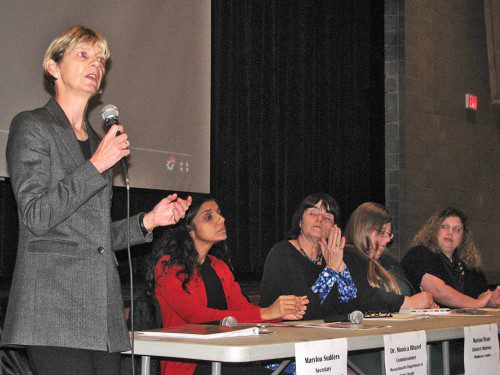
MASSACHUSETTS SECRETARY of Health and Human Services Marylou Sudders spoke at the forum on opioid addiction held at Reading High School. The discussion was moderated by State Senator Jason Lewis (D – Winchester) and featured panelists including (seated from left) Massachusetts Public Health Commissioner Monica Bharel, Middlesex County District Attorney Marian Ryan, Mystic Valley Regional Opiate Abuse Prevention Coordinator Penny Funaiole and Reading Coalition Against Substance Abuse Director Erica McNamara. The forum was co-sponsored by State Rep. Brad Jones (R – North Reading) and Rep. James Dwyer (D – Woburn). (Mark Sardella photo)
Published in the December 11, 2015 edition
By MARK SARDELLA
READING — “Four times more people die in Massachusetts from opioids than from car accidents,” said Massachusetts Secretary of Health and Human Services Marylou Sudders. The comment came last night at a forum on combating opioid addiction at Reading Memorial High School that featured a panel of prominent state and regional officials.
Moderated by State Senator Jason Lewis (D – Winchester), speakers included Sudders, Massachusetts Department of Public Health Commissioner Dr. Monica Bharel, Middlesex County District Attorney Marian Ryan, Mystic Valley Regional Opiate Abuse Prevention Coordinator Penny Funaiole and Reading Coalition Against Substance Abuse Director Erica McNamara.
“We know that the reach of addiction crosses all boundaries,” Lewis said, “including gender, age, income, ethnicity and geography. While much work remains to be done to stem the epidemic, I am encouraged by the unprecedented efforts at the state, regional and local level to significantly improve education, prevention, treatment and recovery supports.”
Sudders said that the opioid crisis has become one of the top five priorities of Gov. Charlie Baker’s administration. She noted that last year in Massachusetts, 4.4 million prescriptions were written for more than 240 million pills, including opioids as well as benzodiazepines like Atavan and Xanax.
“That’s a lot of pills out there,” Sudders said.
She said that there was no one-size-fits-all solution for addiction and that treatment strategies need to be responsive to individual needs and underlying pathologies.
Dr. Bharel, a physician, said that she was encouraged by the attention that is currently being paid to opioid crisis.
“In all my years of working very closely with individuals suffering from substance abuse disorders,” Bharel said, “I have not seen such a concerted effort that Gov. Baker and Secretary Sudders have led along with our judiciary and legislative partners in addressing this issue.”
She said that those with substance abuse disorder should be able to access care in the same way as people with other chronic diseases like diabetes. She said that removing the stigma of addiction would go a long way toward achieving that goal.
“We really want people to see this as a disease and not as a choice that people make,” Bharel said. She said that prescribers need to have the tools to balance the need for pain control against the dangers of opiate misuse. She said that the state’s prescription monitoring system could help physicians in that effort.
Lewis introduced Middlesex County District Attorney Marian Ryan as “a great leader in mobilizing regional efforts to combat the opioid epidemic.”
Ryan asked those in attendance to look beyond the numbers when they hear statistics about opioid-related deaths and remember the real human being that each one of those numbers represents. She cited 130 opioid related deaths in Middlesex County alone so far this year. She stressed that the problem of opioid abuse knows no demographic barriers.
“We have wealthy towns, blue collar towns and inner cities,” she said. “There is absolutely no difference.”
Ryan also talked about law enforcement’s role in the opioid crisis. She noted that fentanyl, which is 100 times more potent than heroin, is being mixed in with heroin by traffickers. She said that was “responsible for an endless number of overdoses we see.” Even experienced users do not account for the enormous amount of fentanyl in the heroin supply.
She noted that until last week there was no law against trafficking in fentanyl but that Gov. Charlie Baker just signed a bill making it a crime to traffic in the drug.
Ryan also talked about Narcan, the opiate antidote that first responders and others now routinely carry in order to reverse overdoses when possible.
“Narcan is not a solution,” Ryan said, “but it gives people an opportunity to fight another day.”
In terms of treatment, Ryan said, “we should be investing in programs and strategies that have proven most effective.”
She also expressed hope that the current heightened efforts will bear fruit. She pointed to the precipitous drop in alcohol-related car-crash deaths since the concerted anti-drunk driving campaigns of the last 20 years.
Penny Funaiole said that stigma is one of the biggest barriers keeping opioid abusers from seeking treatment. She talked about various ways that her agency is working to reduce that stigma.
McNamara discussed prevention efforts and the need for a multifaceted response to addiction.
Several people in the audience shared their stories of how opioid addiction has touched their lives and praised the stepped-up efforts to combat the problem.
“It won’t go away by itself,” said a Melrose man. “Ten years ago, nobody even wanted to talk about it.”




